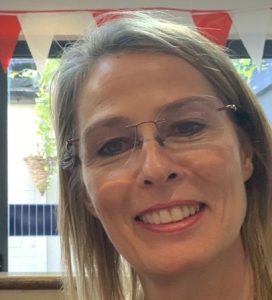 Adele van Wyk is a Research Associate at the NIHR Policy Research Unit in Health and Social Care Workforce at King’s. (1513 words)
Adele van Wyk is a Research Associate at the NIHR Policy Research Unit in Health and Social Care Workforce at King’s. (1513 words)
The Anti-racism Steering Group in the School of Global Affairs at King’s College London (@Kings_SGA) recently held a three-day ‘Decolonising Research Methods in Global Health and Social Medicine’ course (7-9 June 2022), followed by a symposium ‘Decolonising Knowledge Production’ (10 June). Both events were funded by the Faculty of Social Science and Public Policy Education Fund. Their overarching stated purpose was to bring diverse decolonising efforts and ongoing initiatives into the conversation between social science students and early career researchers. They also provided an opportunity to explore the limits of existing research methods in varying geographical locations which as I start my post-doctoral journey in the UK is highly relevant to me.
Discussions covered a wide range of topics, but frequently gravitated to matters around ethics. In this blog, I reflect on six points that stood out for me – in each case ending with suggestions as to how researcher approaches may be improved.
#1. If it is not published, it is not real knowledge
 Several speakers shared the opinion that knowledge that was not a) published in peer reviewed journals or b) produced in a systematic manner such as through research protocols, were not being accepted as valuable. As Nyaradzayi Gumbonzvanda (@vanyaradzayi) explained:
Several speakers shared the opinion that knowledge that was not a) published in peer reviewed journals or b) produced in a systematic manner such as through research protocols, were not being accepted as valuable. As Nyaradzayi Gumbonzvanda (@vanyaradzayi) explained:
‘African knowledge is orally transmitted from one generation to the next, but it is only considered knowledge if it is documented.’
This suggests a significant disconnect between existing indigenous knowledge and the evidence base for it further solidifies the view of indigenous knowledge as inferior or unscientific.
- Consider grey literature or community reports to get a better understanding of what is going on in a particular community – it might get you closer to the information than only published literature.
#2. Trust is secured through a relationship, not by signing a paper
Although the importance of research ethics committees (RECs) is undeniable, there seems to be a need for expanding who is represented on the RECs, and to what extent the voices of communities that are being researched are heard. According to Soheil Jannesari, RECs create distance between researchers and participants, thereby restricting the ways that people express knowledge.
 One thing that all speakers agreed on was the importance of building a relationship with potential research participants. Although this fact is undisputed, it was a welcome reminder of an almost taken for granted aspect of research, namely the research relationship. This goes beyond paying attention to power imbalances, positionality and a reflective practice. In their talk, Francis Nona and Britta Wigginton (University of Queensland) suggested that in order to decolonise research, researchers have to unlearn ways and behaviours of superiorism and build relationships in an interface where all parties can reflect and grow. Researchers and participants should therefore be seen as collaborators in the co-creation of knowledge, and the process of taking consent should reflect this.
One thing that all speakers agreed on was the importance of building a relationship with potential research participants. Although this fact is undisputed, it was a welcome reminder of an almost taken for granted aspect of research, namely the research relationship. This goes beyond paying attention to power imbalances, positionality and a reflective practice. In their talk, Francis Nona and Britta Wigginton (University of Queensland) suggested that in order to decolonise research, researchers have to unlearn ways and behaviours of superiorism and build relationships in an interface where all parties can reflect and grow. Researchers and participants should therefore be seen as collaborators in the co-creation of knowledge, and the process of taking consent should reflect this.
- Don’t sit on a high chair or behind a desk. Sit under the baobab tree or on the floor (on a pillow) – it is about being on the same level.
- Importance of adopting a slow pace when conducting research among a marginalized group of people who also live with a stigmatized illness – helps with gaining trust, build rapport etc.
#3. Data collectionism
 Dr Kaaren Mathias cautioned against ‘data collectionism’ which she defined as ‘an emerging order for the appropriation of human life so that data can be continuously extracted from it for profit’. She proposed that collecting data could be seen as extracting a resource from participants. Positionality is one way of communicating what you as researcher brings to the data collection or analysis, and Dr Mathias recommended being clear and transparent about these aspects from the start. Similarly, Dr Hari Sewell (@Consultancy_HS) proposed that researchers should not extract information, but work alongside people to create knowledge. This made me reflect on how I could ensure that I am not being exploitive when doing research, but rather giving something back to participants and communities, other than reimbursement for time or a small token of appreciation.
Dr Kaaren Mathias cautioned against ‘data collectionism’ which she defined as ‘an emerging order for the appropriation of human life so that data can be continuously extracted from it for profit’. She proposed that collecting data could be seen as extracting a resource from participants. Positionality is one way of communicating what you as researcher brings to the data collection or analysis, and Dr Mathias recommended being clear and transparent about these aspects from the start. Similarly, Dr Hari Sewell (@Consultancy_HS) proposed that researchers should not extract information, but work alongside people to create knowledge. This made me reflect on how I could ensure that I am not being exploitive when doing research, but rather giving something back to participants and communities, other than reimbursement for time or a small token of appreciation.
- Develop the tools and make sure that methodology you adopt goes beyond the traditional data collection. Consider art, music and participatory methods.
#4. ‘Give people their name back’
 Recent years have seen some publications questioning the attainability and desirability of anonymity in some instances.[1, 2] In her talk, Dr Johanna Keikelame stated that ‘giving people their own voice back’ was part of decolonising research. Her participants, like some of my own in my recent PhD study, preferred to use their own name[3]. For them, it was one way of contributing to knowledge not as a faceless or anonymous entity, but as a person in their own right.
Recent years have seen some publications questioning the attainability and desirability of anonymity in some instances.[1, 2] In her talk, Dr Johanna Keikelame stated that ‘giving people their own voice back’ was part of decolonising research. Her participants, like some of my own in my recent PhD study, preferred to use their own name[3]. For them, it was one way of contributing to knowledge not as a faceless or anonymous entity, but as a person in their own right.
There is no doubt that many research participants need to be protected by anonymity (e.g. people without decision making capacity, many patients in medical research and many other cases). However, applying the principle of anonymity for all participants may silence the voices of many others who want to use their own names.
- In ethics applications, communicate to RECs the preference of some participants to use their own name and request that this be allowed.
#5 Insider or outsider?
 Dr Keikalame offered further insights into negotiating the insider/outsider position as a researcher. Though several aspects may situate the researcher as an outsider, they can be ameliorated through transparency and reflexivity. When you enter the data collection field to seek collaboration and acknowledge, declare to participants if you are not African, for example, or not of their particular tribe. Once you have acknowledged who you are, you can position yourself as an outsider, but with the wish to narrow the gap. As Dr Keikelame pointed out:
Dr Keikalame offered further insights into negotiating the insider/outsider position as a researcher. Though several aspects may situate the researcher as an outsider, they can be ameliorated through transparency and reflexivity. When you enter the data collection field to seek collaboration and acknowledge, declare to participants if you are not African, for example, or not of their particular tribe. Once you have acknowledged who you are, you can position yourself as an outsider, but with the wish to narrow the gap. As Dr Keikelame pointed out:
‘Race will always be there but acknowledging your position and meeting each other as humans with respect, it is easier. It is about acceptance and letting them understand and welcome you into their community and respecting them. Although I am black, I am not from this community – don’t assume that all black people are regarded as insiders.’
Being transparent and open will help people see you as a member of the community, not a researcher.[4]
- Take sufficient time to build relationships not only with the participants, but also with others in their community.
#6 Mind your words
 Language plays a critical role in conducting research and communicating findings. It extends beyond using plain or accessible language that participants understand what you are asking of them. It also requires a full understanding of what participants are communicating. Using local interpreters can enhance the understanding of cultural nuances.
Language plays a critical role in conducting research and communicating findings. It extends beyond using plain or accessible language that participants understand what you are asking of them. It also requires a full understanding of what participants are communicating. Using local interpreters can enhance the understanding of cultural nuances.
Most research conducted is communicated in English or other European languages. As a result, it is often not accessible to those who contributed to or may benefit from it. This made me reflect on where to communicate the findings of my own work other than through publication in academic journals. For the participants or wider public to benefit from the knowledge generated, it should be communicated in a digestible and accessible format, possibly a variety of audio-visual and culturally appropriate media.
- Clarify important concepts – ask participants what XYZ (e.g. mental health, depression etc.) means to them – use creative techniques – not brainstorm, mind maps, cognitive, but rather art, model, painting, rap, or other cultural appropriate ways.
- Not ‘othering’ by using words like ‘other ways’ or ‘other knowledge’, but rather ‘many ways’ and ‘many knowledge systems’.
- Disseminating findings and research in the languages of participants.
In conclusion
One speaker (@DrMoncrieffe) stated that having conversations about decolonising makes people afraid. I thought this was bold, so I tested it for myself in conversations with fellow researchers who did not attend the event. The responses I received from several confirmed to me a degree of dis-ease about re-thinking aspects like anonymity and consent, particularly in non-western research settings.
The concept of research is colonial by nature. Attending the two events about decolonising research left me with the following question: How can we open discussions of knowledge exchange that we call ‘research’ in communities that are not familiar or do not place the same premium on the process of research?
I am open to engage in discussion with other interested parties.
Adele van Wyk is a Research Associate at the NIHR Policy Research Unit in Health and Social Care Workforce at King’s. You can contact her on Adele.vanwyk@kcl.ac.uk or via Twitter @Adele_van_Wyk.
Further reading
Fadiman, A. (1998). When the spirit catches you and you fall down. https://en.wikipedia.org/wiki/The_Spirit_Catches_You_and_You_Fall_Down
References
- Beresford, R. and N. Emmerich. Is the presumption of anonymity a matter of protection or paternalism? Obtaining ethical approval for participatory research on pornography, SAGE Research Methods. Cases. 2018, London: SAGE Publications Ltd.
- Liabo, K., H. Roberts, and N. Emmerich, Anonymity in participatory research : is it attainable? is it desirable?, edited by Nathan Emmerich. SAGE Research Methods. Cases. 2018, London: SAGE Publications Ltd.
- Keikelame, M.J. and L. Swartz, Decolonising research methodologies: lessons from a qualitative research project, Cape Town, South Africa. Global health action, 2019. 12(1): p. 1561175-1561175.
- Keikelame, M.J., ‘The Tortoise under the couch’: an African woman’s reflections on negotiating insider- outsider positionalities and issues of serendipity on conducting a qualitative research project in Cape Town, South Africa. International journal of social research methodology, 2018. 21(2): p. 219-230.